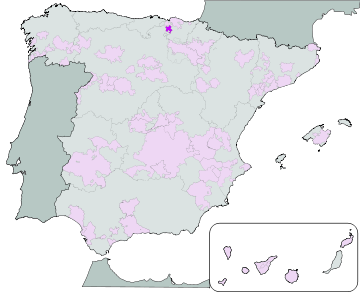Txakoli de Álava

Txakoli de Álava (Basque) or Chacolí de Álava (Spanish) is a Spanish Denominación de Origen (DO) (Basque: Jatorrizko Deitura) for wines, located around the towns of Amurrio, Llodio, Artziniega, Okondo and Aiara in the province of Alava, Basque Country, Spain.
Txacolí is a thin white acidic wine that can be naturally fizzy and is traditionally served like cider, poured from a height into the glass.
History
This DO was created in 1989 on the initiative of the five remaining txacolí producers in the province. In that year there were only 5 ha under vines producing txacolí. However wine had traditionally been made in this manner for hundreds of years and was popular from the Middle Ages up to the end of the 19th Century, when the vines were devastated by the phylloxera virus and the effects of industrialization of the Basque Country.
Climate
- Maximum mean temperature: 18.7°C
- Minimum mean temperature: 7.5°C
- Mean temperature: 13.1°C
- Mean annual rainfall: 900 l
Grape Varieties
The main authorized grapes are the white Hondarrabi Zuri and black Hondarrabi Beltza, along with Petit Manseng, Gros Manseng and Petit Corbu. Almost all the vines are trained on trellises (en espaldera) due to the high levels of rainfall and humidity in the area.
Vineyards
- There are 60 ha of vineyards registered with the D.O.
- Maximum authorized planting density: 2,500 to 3,500 vines/ha
- Maximum authorized yield: 12,500 hg/ha
- Minimum alcohol content: 9.5º%